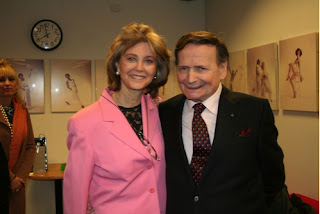One thing I love -- love! -- about the Internet, about Blog-O-Land, is that you toss something out there on the way to bed, you do not really think about it, and the next morning surprises are waiting for you.
Last night I just ruminated a bit about Byron Janis when I was sitting around in my pajamas and this morning, I get this note from my friend Steve Baker who is now, ahem, Senior Director of Marketing at the San Diego Symphony. Steve is a great Facebook friend because he is intense and loves music. And he told me that on the Vanity Fair Web log site
you can hear Byron Janis reading an excerpt from his book which is
"Chopin and Beyond: My Extraordinary Life in Music and the Paranormal."
These are great days for books on pianists, you know? We recently got "
My Nine Lives," by Anne Midgette and Leon Fleisher, and now there is this memoir by Byron Janis. Also I wonder about the memoirs of Earl Wild. I know he had been working on them. I think they might be out. Anyway, it is great that the public cares so much about these people, these pianists.
Back to Byron Janis. I had not known about this book and I have to say the title intrigues me. What, is he talking with Chopin? Does Horowitz visit him in his dreams and impose more lessons on him? These are questions that will have to be answered.
I have to mention this, Vanity Fair proves what I said
yesterday, that you never hear Byron Janis' name without Horowitz's name being right there next to it. There it is, first sentence: "Renowned concert pianist Byron Janis -- the first student of Vladimir Horowitz at age 16 -- has made quite a remarkable career..."
Working on my book on Leonard Pennario at least I do not have to worry about his being eclipsed by some teacher. Well,
no one eclipsed Pennario. But that must be a particular kind of bummer, you get identified with some teacher at 16, for Pete's sake, and in a way it is downhill from there. It has its advantages, sure. But I do wonder how Byron Janis, a bright and interesting man in his own right, feels about that tie with Horowitz being his biggest credential.
Perhaps he will talk about that in his book.

















